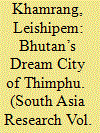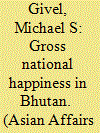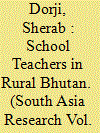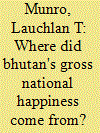| Srl | Item |
| 1 |
ID:
174913


|
|
|
|
|
| Summary/Abstract |
Buttressed by the philosophy of Gross National Happiness (GNH), Bhutan’s development policies are inherently grounded in balancing material and spiritual well-being, while Bhutan’s capital city, Thimphu, has over the past few decades experienced phenomenal growth and urban transformation. This article builds on the notion of socio-spatial dialectic to examine the new forms of social ordering in the urban space of Thimphu. Critiquing the idealisation of Thimphu as a dream city for all, it endorses instead the development of regional growth centres and small towns. This underlines the potential of stimulating regional economic development, as a better strategy for inclusive growth and actualisation of Bhutan’s philosophy of GNH.
|
|
|
|
|
|
|
|
|
|
|
|
|
|
|
|
| 2 |
ID:
137385


|
|
|
|
|
| Summary/Abstract |
This policy essay examines the historical and policy evolution in Bhutan from the creation of Bhutan in the 1600s to 2014. An examination of the overarching policy intent of Gross National Happiness is reviewed as well as how modern political institutions in Bhutan implement Gross National Happiness. In the 17th and 18th centuries, the new Bhutanese state founded by the Shabrung Ngawang Namgyal established its political and institutional right and legitimacy to rule based on Mahayana Buddhism canonical tenets, including ensuring that Bhutanese citizens could obtain Enlightenment and happiness. A modern manifestation of this historical precedent for state and political institutional intervention to promote collective happiness is embodied in the policy of Gross National Happiness. This essay concludes by noting that modern Gross National Happiness is a holistic development approach based on a trend emanating from more ancient Mahayana Buddhist traditions Gross National Happiness balanced with modern economic, governmental, and social conditions with Mahayana Buddhist spiritual requirements embodied in Gross National Happiness.
|
|
|
|
|
|
|
|
|
|
|
|
|
|
|
|
| 3 |
ID:
170171


|
|
|
|
|
| Summary/Abstract |
In Bhutan, recent increases in annual teacher attrition rates, particularly in rural areas, pose significant challenges for the government and concerned agencies in terms of retaining qualified teachers and reducing teacher attrition rates and turnover. This article, partly based on a field study exploring the quality of work life (QWL) and well-being of school teachers in rural Bhutan, explores the possible reasons why such teachers might seek to resign. Using mixed methodology, the study reveals poor QWL and well-being of teachers, caused by a variety of factors. In view of such findings, the Ministry of Education and the government need to ensure better all-round protection for teachers to avoid the risk of large-scale resignations.
|
|
|
|
|
|
|
|
|
|
|
|
|
|
|
|
| 4 |
ID:
144205


|
|
|
|
|
| Summary/Abstract |
The Kingdom of Bhutan has attracted international attention for adopting “Gross National Happiness” (GNH) as its national development policy. The central notion is that gross national happiness is more important than gross national product; the four pillars of GNH are sustainable economic development, good governance, preservation of the natural environment and preservation of the national culture. This paper traces the historical origins of the concept of Gross National Happiness and finds that GNH is newer than the literature and the propaganda usually suggest. Close study of GNH's origins and salience over several decades reveals evidence of the invention of a tradition, in Hobsbawm and Ranger's terms [Eric Hobsbawm and Terence Ranger (Eds.), The Invention of Tradition. Cambridge: CUP, 1983]. The meteoric rise over the last 15 years of GNH as Bhutan's official ideology is a key part of the Bhutanese state's efforts at nation building in the context of rapid and disruptive social and economic change in a highly plural society.
|
|
|
|
|
|
|
|
|
|
|
|
|
|
|
|